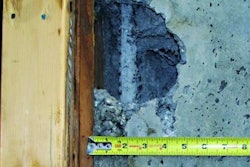One omission from the spending legislation that passed the House on Wednesday was President Obama's proposal to pump $50 billion into an array of infrastructure projects.
The continuing resolution (HR 3082) to fund the government through the end of fiscal 2011 would have been a natural vehicle for the program, which Obama announced on Labor Day and wants to start work on early next year.
Obama's idea was to "front load" this spending immediately as a down-payment on the first year of a multiyear surface transportation bill, which is now long overdue.
Lawmakers greeted the president's idea with lukewarm statements at best. Many considered it strangely constructed -- it proposed funding aviation programs as part of a surface transportation bill, for instance -- and vaguely defined.
Still, it's a missed chance for one of Obama's transportation priorities in the upcoming year, and it underscores the challenges ahead in putting together a new surface transportation bill.
Also Wednesday, members of a congressionally commissioned panel tasked with charting a plan for the future of transportation policy issued a plea for Congress to govern on the issue.
In a joint statement, the National Surface Transportation Infrastructure Financing Commission and the Bipartisan Policy Center's National Transportation Policy Project recommended that lawmakers use their work as a starting point for negotiations next year.
But one of the commission's marquee recommendations -- raising the motor fuels tax to help adequately fund maintenance and improvement of the country's infrastructure -- is the crux of the reason Congress has not passed a new surface transportation bill.
The Obama administration says it won't support a gasoline tax increase while the economy is struggling. And with Republicans riding to House control on a mandate of cutting spending, the GOP isn't likely to support it, either.
Rob Atkinson, chairman of the financing commission, urged Congress to "find common ground" on outstanding issues, which he said means "accepting the need for higher user fees while at the same time requiring stricter accountability and real performance standards in how federal money is invested."
The continuing resolution does include some policy provisions, including language that appears to prohibit any spending under the measure on earmarks laid out by fiscal 2010 appropriations. As part of this, the Surface Transportation Priorities program, which consists solely of earmarked spending, would not be funded under the bill.
The spending bill also includes much of a measure (HR 5730) that would roll back unobligated balances for earmarked projects in past surface transportation bills dating back at least two decades.
It also would allocate significantly less for high speed rail over the next year: $1 billion, equal to Obama's fiscal 2011 request. Congress gave $2.5 billion to high speed rail in fiscal 2010.
The discrepancy is primarily due to the fact that this time around appropriators didn't have additional money to reallocate from the administration's National Infrastructure Bank proposal, which Congress has so far refused to allow.
Earlier drafts of the spending measure had included language to make permanent a truck weight exemption for Maine and Vermont, an administration recommendation. While the final version of the House package did not include that provision, it could resurface in the Senate, where it carries strong support from Susan Collins, R-Maine, and Patrick J. Leahy, D-Vt.
The continuing resolution contains two extensions of expiring transportation programs: surface transportation and aviation. Both programs, which will expire Dec. 31, would be extended through the end of the fiscal year, Sept. 30.
And, in a final nod to outgoing Transportation and Infrastructure Chairman James L. Oberstar, D-Minn., the spending bill would make some of the changes he has sought for months to highway formula funding, according to spokesman Jim Berard.
Oberstar has long sought to roll back Senate changes to the way certain highway funds were distributed under a jobs bill (PL 111-147) enacted earlier this year. A provision in that law distributes some new highway funds under criteria established in the last surface transportation law (PL 109-59), effectively steering most of the money to four states while giving 22 states nothing.
Oberstar wanted the money distributed more evenly among states and across programs. The spending bill contains language that would distribute the money more evenly across programs, but not among states.
Source:
















